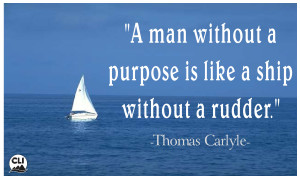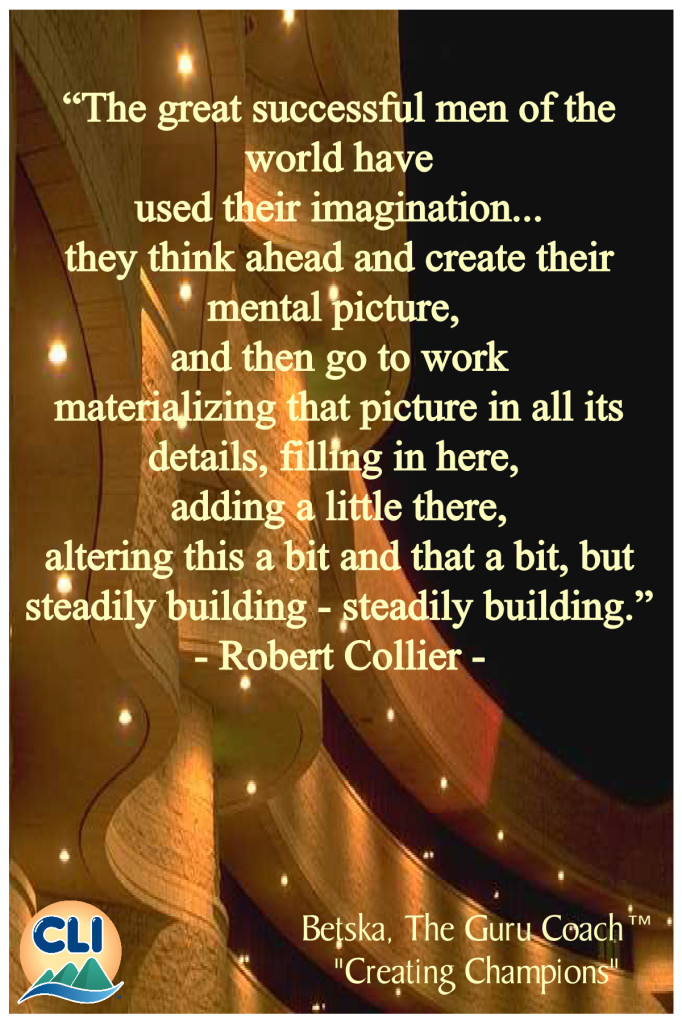Tag Archives: Goal Setting
Where Did I Put My Rudder?
This is Application #2 for Creating Champions in the workplace, part of a series of blog articles with the overall theme of “When your staff succeeds, so do you.”
Application #2 — Develop and Communicate Goals
“A man without a purpose is like a ship without a rudder.”
-Thomas Carlyle-
(Tweet this!)

Thomas Carlyle, born in 1795, was a Scottish philosopher, satirical writer, essayist, historian and teacher. Considered one of the most important social commentators of his time, he presented many lectures during his lifetime with certain acclaim in the Victorian era.
If Mr. Carlyle was lecturing today, his same words from 200 years ago would still apply today. [The only exception would be that instead of saying “man”, he would replace it with “human”.]
 “There is no analogy more powerful. A ship without a rudder would be lost forever. The same applies to humans.”
“There is no analogy more powerful. A ship without a rudder would be lost forever. The same applies to humans.”
Where is your own personal rudder? Do you know why you are here on this planet? Do you know your purpose? What gives you meaning in your life? If you need a good vehicle to determine your life purpose, visit www.coachingandleadership.com and click on Free Self Coaching. Once you are in, on the side bar, click on Life Spiritual Purpose. Chances are this profound exercise will change your life – in a good way. You will finally be grounded in a spirit-ual purpose which will become your rudder. During one coaching session, I listened as one of my Executive Coaching Clients became totally awakened when she said, “Betska, oh my God. I just realized that my #1 reason for being is ‘To be a student and teacher of leading from the heart first.’” This client had been leading from her logical self for most of her life and was failing miserably as a leader who engages people. Today, she is on track, happier and far more successful because she is leading from her heart first.
Where is your organization’s rudder? Have you created your own department’s MVGV: Mission and Vision statements, a set of Goals and a list of corporate Values which every one needs to follow in order to accomplish the Vision? Most organizations have these foundational elements from an overall corporate perspective; however, what I am referring to here is an MVGV for your own department or unit. For example, the Finance Department should have their own MVGV because their mandate is different than the mandate of Human Resources. Of course, this MVGV, must be aligned with the corporate one.
Whether we are speaking about our own personal rudder or the organization’s rudder, as the old saying goes,’ how can we get anywhere if we don’t know where we are going?’
We live in an unpredictable world with changes happening at the blink of an eye.
So how can we plan if changes are rampant and unpredictable?
“The great successful men of the world have used their imagination…they think ahead and create their mental picture, and then go to work materializing that picture in all its details, filling in here, adding a little there, altering this a bit and that a bit, but steadily building – steadily building.”
– Robert Collier –

Just as Collier states, we must draw the plan and frequently make adjustments to account for demographic and lifestyle changes.
The key is to keep the plan simple. Otherwise we can get overwhelmed.
In my next blog article, we’ll be discussing what Sheryl Sandberg, COO of Facebook, has to say about leadership. This incredibly gifted leader is a role model for both men and women in leadership today.
Tune in next time where we will explore the 7 Quick Planning Steps for SHAPING YOUR FUTURE.
Betska, The Guru Coach™
Creating Champions
Sign up for CLI QuickTips™ and Blog Updates at:
Coaching and Leadership International Inc.
The Giant Leap From Chaos to Balance
Building the Foundation
Are your daily responsibilities draining your energy or zipping you up? Do you have too many plans or too few? Do you have time to do most of the things you want to do, or do you need to make that giant leap toward taking control? Whether you’re a student, homemaker, job-seeker, or one of the many over-worked employed, the same question applies: How do we give and take in the spectrum of needs for family, rejuvenating friendships, intellectual and physical stimulation, career, personal development, adequate rest, time for ourselves, and lots of fun all at the same time?
The answer lies in balancing the various needs and responsibilities in your life according to your own personalized, prioritized plan. That means taking charge. By taking control you’ll meet your intellectual, emotional, physical, and spiritual needs on a day-to-day basis in a low-stress, healthy way.
Webster’s dictionary defines balance a little more literally. It is: “a state of equilibrium, and/or the process by which something is brought into or held in equilibrium.” Imagine an old-fashioned weigh scale for a moment; the scale itself representing the measuring medium, and the items you load on each side the various aspects of your life. Weigh down the one side with career; study, if you’re a student; time spent in job search if you’re making a leap from school to the work place, and so on. Weigh down the other side with all the other responsibilities and activities in your life. How can you balance career and personal life so that one not only complements, but actually releases tension in, and rejuvenates the other?
In order to achieve equilibrium in our lives two things are necessary:
First: Create a plan for your life that reflects your personal values and beliefs.
Take a good, hard look at your life. Does your daily lifestyle reflect your personal goals, values, and beliefs? If you were to write your own ticket to lasting happiness, what would you want most? A job? A more rewarding job? A contented family life? What do you want?
As you work your way through, set some one, five, and ten year goals for yourself. Address the people and activities you value most in your plan and be sure your goals inspire you! A personal plan defines your purpose and charts your direction into the future. Following its course will reward you with a sense of personal accomplishment, self-esteem, inner peace, lasting happiness, and, of course, continual stimulation.
Secondly: achieving balance requires that:
You make adequate time for each of the people and activities that are important to your well-being. Weighing down the scale with work to the exclusion of family, friends, hobbies, and exercise is poor boredom, or complete burn out. Ironically, devoting all your energy to one task can be just as chaotic as frantically trying to fit everything into your schedule without a plan. Making adequate time for the people and commitments that you value is an act of will; wishing you had the time isn’t going to get you there. It means planning with whom and on what you’ll be focusing your energy at any given time (a daily planner really helps), and then sticking to that.











